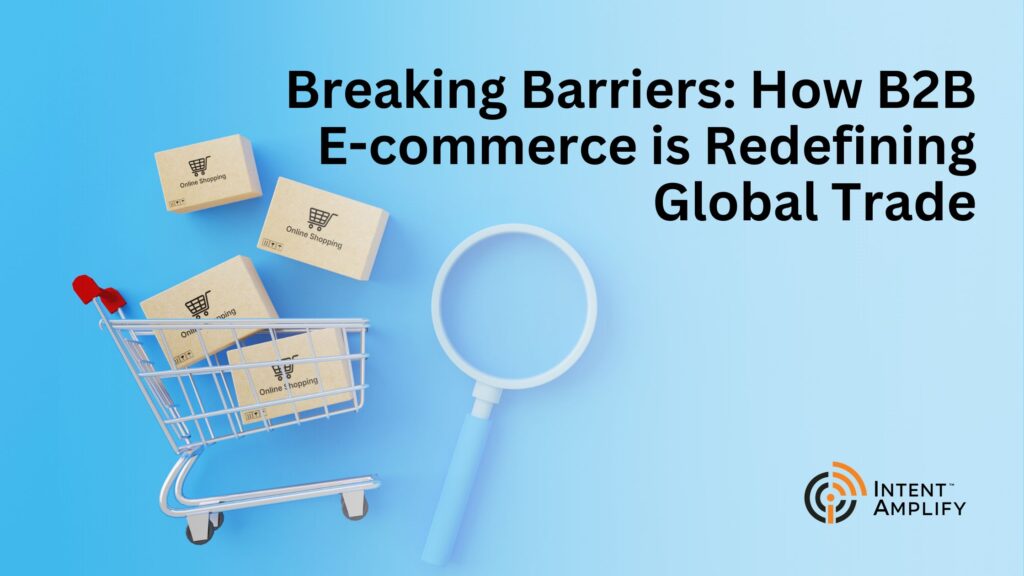
Breaking Barriers: How B2B E-commerce is Redefining Global Trade?
In the world of digital commerce, we have witnessed some significant advancements ever since the pandemic. During that period, when the entire world faced a substantial lockdown, we people understood the significance of digital presence. This is precisely the period when e-commerce hit the roof. It had become the only thing easily accessible and led to supplying and further things done rapidly.
Little did the world know before it got all engrossed in E-commerce and more prominently in B2B. It deals with online transactions wherein it begins with a business and benefits another business. The concept deals with multiple business strategies involving various models ranging from services like accounting, to physical, and digital. It even involves machinery, equipment, consumer goods and so much more.
It was the same period when many companies drifted from offline to online domains, as it was way easier for people to assess and deliver because of the advent of the internet. The statistics gathered showcased how local as well as international business buyers congregate online.
Let’s take a deeper dive into the world of B2B E-commerce and learn more about it!
What is B2B E commerce?
To put it in simple words, B2B E-commerce associates a set of products or services to another business. It typically involves a group or department using a vendor’s product and services. This is usually a single user on the buyer side making transactions working in association with the organization’s goals. Some of these interactions between businesses involve numerous elements of its products, such as office furniture, laptops in many ways, and software for productivity.
B2B holds a critical spot, as each business needs to promote, sell and promote products from other businesses to launch, operate and grow. The supplies include office space, furniture, computers, software, hardware, and many other things.
Benefits of B2B E-commerce
- Elevated switching costs
B2B customer loyalty is likely if they are mostly satisfied with the product and service. On the contrary, B2C customers can be finicky and not loyal, resulting in a large sum of people leaving the organization would take a hike.
- Huge average deal size
B2B companies can grow sales with small amounts of high-value deals compared to a B2C company. As it requires thousands or even millions of individual sales. Since B2B companies run buying and selling in bulk, the amount is most likely to be at a high rate than a B2C company.
- Large Market Potential
When B2B organizations pursue enterprises across multiple sectors and geographies, they are playing on a large field. This means B2B specializes in one industry at one time and leads at the frontier in it.
B2B organizations advertise their products and services while conducting business online, easing it for clients to place bulk orders through a good enough digital transaction model.
- Fast Delivery
In the B2B e-commerce tools tend to make the sales process easy going for the online sellers, this accelerates the process for the buyers. The part of integrated systems lets transacting companies sync the data collected across channels as it automates the required needs and inventory updates while also managing complicated orders.
- Order Management
The platforms are based on cloud-based associates with the back-end systems or order management systems. This enables B2B sellers which is synchronized with inventory as well as data of customers across channels.
Recent Trends in B2B E-commerce
- Omnichannel Experience
Buyers in the B2B arena have already adopted omnichannel marketing. Purchasers are given a plethora of choices like in-person, remote, and e-commerce channels too. As customers are the king in the digital marketplace.
- Social B2B E-Commerce
The attributes of promoting and selling products through social media have increased incredibly. It keeps customers hooked to its brand and is undoubtedly a game changer in 2023. According to reports, 35% of internet users in the United States do purchases through social media, while in China hikes up to 50%. B2B businesses would soon be launching their e-commerce stores on social media like Facebook, Instagram, and Pinterest.
- Personalized Customer Experience
B2B businesses wishing to treat their customers with the next personalization, need to dig up their personal behaviors and attitudinal attributes with the aid of personalized customer experience. It helps track how. when, where, and why customers shop and provide them with customized tailored seamless end-to-end experiences.
In accordance to boost customer reliability and loyalty, businesses need to build solid customer-centric approaches making them remember the brands for a longer period of time. Ensure to have reciprocating Return on Experience measures to track their loyalty while making sure their experience gives them their desired effect,
- Digital Supply Chain Management
B2B E commerce organizations need to build a robust digital supply chain framework as it ensures successfully navigating through challenges such as inventory management along with delivering personalized customer experience. Leaders working at the forefront of the B2B industry need to focus on integrating their fundamental supply capabilities with trending digital strategies. It helps them defend against global supply chain consequences and stay competent in the market.
Popular Examples of B2B Companies
Google brought its B2C search engines, while also offering many B2B software services. Google G-Suite provides word processing, spreadsheets, and calendar for businesses, while their marketing suite provides Google 360 provides critical tools for digital marketers. It also provides advertisements on its search results as one of its primary revenue streams.
A well-known example of a B2C company with a B2B business portal named Amazon Web Services (AWS). AWS gives us computing power, storage for the delivery of content with many other features to facilitate businesses. It is one of the leading cloud companies that work with customers like GE, Expedia, Philips, and many more to name a few. Their cloud expands with storage with different availability zones with about 25 geographic regions.
- Alibaba
Another example is widely known for its largest online commerce companies all around the world. Alibaba marketplace is a place for buyers and sellers where they connect and transact for their business.
- Upwork
This platform has gained a lot of youth as it offers job opportunities for freelancers with employers on projects like web and mobile app developments accompanied by social media marketing, content writing, graphic design, and so many more job profiles.
Caterpillar generates construction and mining equipment for diesel and natural gas engines, industrial turbines, and diesel-electric locomotives that are sold as products to other businesses. The company provides financial services to businesses via Caterpillar Financial Services units of business.
End Note
B2B E commerce has been growing exponentially on a huge level leading to outshine the B2C market in the future. Most potential business organizations opt for this because of the introduction of Digital Marketing. The reason behind it is the fact that it creates solutions with transparency within business transactions.
According to Statista, the United States earned $969 billion in the year 2017. Later in 2018, it increased drastically to $6.4 trillion with a 17% increase in overall transactions. By the year 2023, the global B2B e-commerce market value is most likely to reach around $7 trillion.
The shift towards B2B views digital commerce as a perfect income chance. As a new entrepreneur looking forward to using B2B for fruitful outcomes, it’s the best choice for you!





